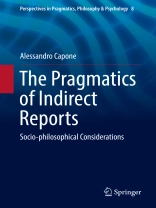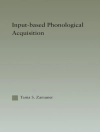This monograph on indirect reports offers insights on the semantics/pragmatics interface and a refinement of the notion of explicature. The volume is written in an engaging style and guides the reader through the theoretical problems and their ramifications. The thorniest problem in the study of indirect reports is their polyphonic nature, and how the listener distinguishes between the reporter’s voice and the original speaker’s voice, either by contextual clues or, in the absence of such clues, by resorting to pragmatic principles.
The introductory chapter discusses the main issues that will be addressed in the volume. The next chapters focus on the various aspects of indirect reports, covering both theory and practical applications.
قائمة المحتويات
Preface.- Acknowledgements.- Putting the threads together.- On the social practice of indirect reports.- On the (complicated) relationship between direct and indirect reports.- Indirect reports as language games.- Indirect reports and footing.- Reporting non-serious speech.- Indirect reports and slurring.- Indirectly reporting and translating slurring utterances.- Belief reports and pragmatic intrusion (the case of null appositives).- The pragmatics of attitudes ‘de se’.- Consequences of the pragmatics of ‘de se’.- Impure ‘de se’ thoughts and pragmatics (and how this is relevant to pragmatics and IEM).- Attributions of propositional attitude and pragmatic intrusion.- Simple sentences, substitution and embedding explicatures (the case of implicit indirect reports).- General Conclusion.












